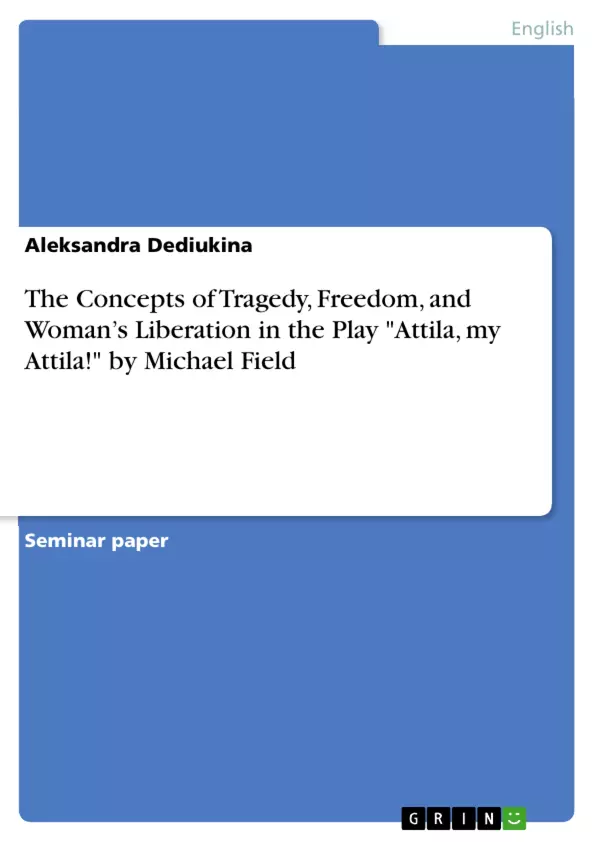This paper contains the analysis of the selected scenes of Michael Field’ play "Attila, my Attila!", examined through the prism of Nikolas Berdiaev’s work "The Destiny of Man". Specifically, the perception of human tragedy in both works was touched upon: The authors declare its entanglement with human freedom. According to Field and Berdiaev, to respond to tragedy, one must act and fight against the imposed artificial norms, dictated by secular and religious institutions. By acting, one reveals their vital creative potential that provides them with inner strength that is impossible to be ruined by any calamities.
A similar concept of tragedy can also be traced in the works of Nikolas Berdiaev, Russian Orthodox philosopher of the 20th century. Although there is no evidence that he could ever read Field’s play (which is overall highly unlikely), Berdiaev writes about tragedy, freedom, creativeness, and personality in a way that chimes with that of Field’s. In Berdiaev’s ethical system, a human is inherently endowed with freedom by God; However, freedom makes life tragic because it brings responsibility for one’s choice. The only way to overcome tragedy is to embrace creativeness — a quality that differs an individual, which is a biological category, from a wholesome personality.
These ideas are represented in the most prominent Berdiaev’s works. In this paper, analysis of tragedy, as it was understood by the philosopher, will be carried out on the material of "The Destiny of Man" (Berdiaev: 1931, quoted as D.M.). Berdiaev’s core ideas, reflected in this book, will be applied to "Attila, my Attila!" in order to discover similarities and differences in the way the three authors in question viewed the tragedy of human life. It is important to stress that Field’s work is mostly focused on tragedy from a female angle, while Berdiaev explores this notion in a more general, human sense.
Inhaltsverzeichnis (Table of Contents)
- Introduction
- In Search of Freedom. Michael Field and Nicholas Berdiaev
- Michael Field
- Nicholas Berdiaev
- The Destiny of Woman
- Preface: Tragedy of Tragedies
- 'The Tragedy of Freedom' in Berdiaev's Theory
- Honoria as Embodiment of the New Ethics
- 'But am I not to Love?' Act 1
- Creation and Destruction. Act 3
- Conclusion
Zielsetzung und Themenschwerpunkte (Objectives and Key Themes)
This paper explores the tragic conflict in the play Attila, my Attila! by Michael Field, focusing on how tragedy is redefined through the lens of freedom and female liberation. The paper compares Field's work with the ideas of the Russian philosopher Nicholas Berdiaev, who shared similar views on the relationship between freedom, responsibility, and tragedy. The analysis aims to uncover the interconnectedness of these concepts in shaping human existence and the evolving understanding of tragedy in both literary and philosophical contexts.
- Redefining tragedy through the concept of uncurbed freedom and its consequences.
- Exploring the concept of female liberation and its complexities in the context of the play Attila, my Attila!.
- Analyzing the interconnectedness of freedom, responsibility, and tragedy in the works of both Michael Field and Nicholas Berdiaev.
- Examining the influence of historical and cultural contexts on the authors' perspectives on human freedom and its tragic implications.
- Highlighting the significance of creativity as a means of overcoming the inherent tragedy of human existence.
Zusammenfassung der Kapitel (Chapter Summaries)
- Introduction: This chapter provides a brief overview of the play Attila, my Attila! and introduces the concept of tragedy as it is presented in the play. The chapter also sets the stage for the paper's analysis by highlighting the similarities between Michael Field's and Nicholas Berdiaev's views on tragedy and freedom.
- In Search of Freedom. Michael Field and Nicholas Berdiaev: This chapter presents biographical information about the authors, Michael Field and Nicholas Berdiaev, highlighting their respective backgrounds and contexts. It emphasizes the surprising parallels between their perspectives on human freedom and tragedy, despite their different cultural and literary traditions.
- The Destiny of Woman: This chapter delves deeper into the play Attila, my Attila!, focusing on the character of Honoria and her struggle for liberation. The chapter analyzes how Honoria's choices and the consequences of her freedom embody the themes of tragedy and female emancipation. It draws parallels between Honoria's story and Berdiaev's philosophical ideas about freedom and responsibility.
Schlüsselwörter (Keywords)
Key concepts and terms central to the paper include: tragedy, freedom, woman's liberation, Michael Field, Nicholas Berdiaev, Attila, my Attila!, The Destiny of Man, New Woman, responsibility, creativity, and existentialism. The paper explores the intersection of these concepts within the context of both literary and philosophical analysis, examining how they shape human experience and understanding of the human condition.
- Citation du texte
- Aleksandra Dediukina (Auteur), 2024, The Concepts of Tragedy, Freedom, and Woman’s Liberation in the Play "Attila, my Attila!" by Michael Field, Munich, GRIN Verlag, https://www.grin.com/document/1477200



